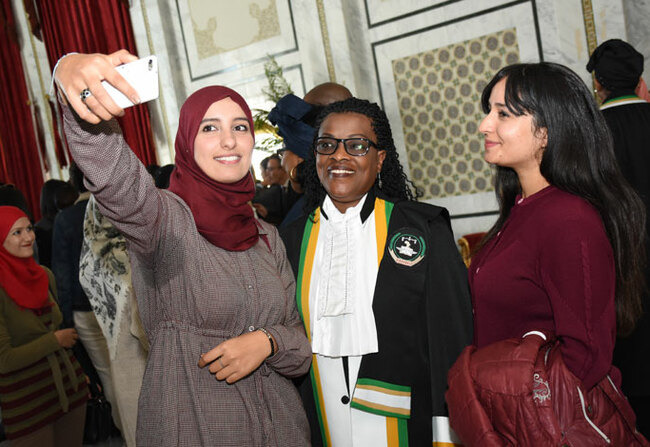African Court president hails Tunisia on human rights
Nov 13, 2018
The Court is composed of 11 Judges who are nationals of Member States of the African Union

The President of The African Court on Human and Peoples' Rights (AfCHPR) has hailed Tunisia's people and leaders for their commitment to upholding human rights, saying the country should be referred to as the new el dorado of human rights in Africa.
"In addition to assuming the mantle of pioneering a more or less fourth wave of democratization in Africa inaugurated by the Arab Spring,the constitutional ingenuity recently demonstrated by the Tunisian elite with the backing of a people unchained by the intense drive for freedom has indeed become a political learning house, a social inspiration and a universal celebration, as eloquently recognized at the Nobel Peace Hall of Fame," said Honourable Sylvain Oré.
He was speaking on Monday during the opening ceremony of the 51st Ordinary Session of the African Court on Human and Peoples' Rights sitting in the capital Tunis.
Quoting the country's constitution, Hon. Oré said Tunisia and the African quote shared ideals of participatory democracy, independence of the judiciary, equality and respect for the fundamental rights of the human person.
"In what may be aptly describe as a logical sequence of events, Tunisia in May 2017, deposited the declaration recognizing the jurisdiction of the African Court, thus entering the very restricted circle of eight Member States of the African Union to have done so, out of 55," he said.
 University students pose for a picture with Lady Justice Marie Thérèse Mukamulisa of Rwanda (m) after the opening ceremony of the 51st Ordinary Session of the African Court in Tunis,Tunisia, on 12 November, 2018 (courtesy Pictures).
University students pose for a picture with Lady Justice Marie Thérèse Mukamulisa of Rwanda (m) after the opening ceremony of the 51st Ordinary Session of the African Court in Tunis,Tunisia, on 12 November, 2018 (courtesy Pictures).
The Court, which is composed of 11 Judges who are nationals of Member States of the African Union elected in their individual capacity, is sitting from November 12 to December 7, 2018 in Tunis, the capital of Tunisia.
The Judges, among others, will examine over 10 applications during the four-week session and at least five Judgments are scheduled during the period.
Hon. Oré explained that it was the entire African Court that has made the journey to Tunis; not only the judges of the Court.
"It is Africa in miniature that has come to Tunisia; an Africa of the rule of law and freedoms; an Africa of women's rights and women's participation in socio-political and economic life;
An Africa of open public governance involving all citizens irrespective of status; an Africa where justice has progressed from necessity to become an imperative; and, hence, an Africa for which Tunisia has become the worthy torchbearer," he emphasized.
The the African Court on Human and Peoples' Rights was established in 1998 with the primary mission to ensure the judicial protection of human rights in Africa.
With its Seat in Arusha in the United Republic of Tanzania, the Court opened its doors in 2006 and rendered its first judgment in 2009.
As of today, it has received over 180 Applications and delivered numerous judgments on various human and peoples' rights issues.
The Court holds four ordinary sessions each year, each session lasting four weeks, and extraordinary session where conditions so permit.
The Court is a fully fledged judicial imperium in as much as it is empowered to take and order all such measures as are necessary to ensure effective administration of justice, including the conduct of investigations, holding of public hearing for the parties, ordering various measures and rendering judgments with immediate binding effect.
Lady Justice Solomy Balungi Bossa was Uganda's last national representative to the court. Her tenure was cut short when she moved to serve at The Hague.
